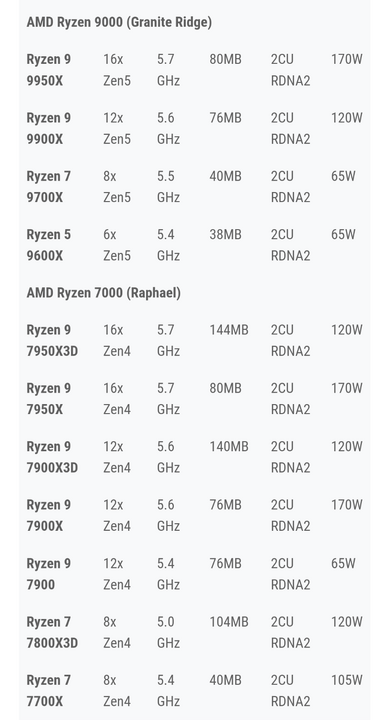Welcome to ExtremeHW
Welcome to ExtremeHW, register to take part in our community, don't worry this is a simple FREE process that requires minimal information for you to signup.
Registered users can:
- Start new topics and reply to others.
- Show off your PC using our Rig Creator feature.
- Subscribe to topics and forums to get updates.
- Get your own profile page to customize.
- Send personal messages to other members.
- Take advantage of site exclusive features.
- Upgrade to Premium to unlock additional sites features.
-
Posts
2,652 -
Joined
-
Last visited
-
Days Won
74 -
Feedback
0%
Content Type
Forums
Store
Events
Gallery
Profiles
Videos
Marketplace
Tutorials
Everything posted by UltraMega
-
I actually prefer the 65w CPUs because the thermals are soooo much better. Top tier performance is obvious great for anyone who wants that, but IMO the X700 CPUs like the 5700x and 7700 are the real winners for AM4 and AM5 right now. All those prebuilds I made a while back had either 5700x or 7700 CPUs, all had standard $25 120mm coolers and all ran with great temps.
-
If there isn't a store near by that has plants you like, you can order them here: https://www.aquariumcoop.com/collections/live-plants Be sure to post some pics once you get it setup
-
My tank just has sand, not substrate. My sand is expensive aquarium sand, but my gf has a tank too and we set that up with sand from a rock yard that was so cheap it was basically free. Both work equally well. Avoid small ground cover plants. Those never do well without extreme planning, but just about anything else will likely work just fine. I don't even use carbon filters in my tank. I just buy a big roll of filter medium, and cut it to fit in my filter. Vastly cheaper. The carbon in those pre-made filter cartridges is totally useless and it's purely a gimmick to get you to buy the expensive cartridges. I'll just add, be sure you want to commit to the nano tank before you set it up. I think a lot of the time people start small and quickly decided to go bigger. There are usually a lot of 10 and 20 gallon tanks for free on Craigslist around here, and if you get a standard size tank like that then you can probably also find a pretty cheap glass lid for it at petco or on Amazon, and then you will be able to get whatever kind of led strip you want and the plants will blow up.
-
https://www.guru3d.com/review/amd-announces-ryzen-9950x-9900x-9700x-9600x-processors-zen5/ Happy to see lower TDPs on some of these chips. The 9600x and 9700x will probably run fine on a standard 120mm air cooler.
-
I think you're right. I forgot the name of that thread otherwise I would have just bumped it.
-

videocardz NVIDIA RTX 5090 new rumored specs: 28GB GDDR7 and 448-bit bus
UltraMega replied to ENTERPRISE's topic in Rumour Mill
I have no doubt Nvidia will continue to skimp on vram on the rest of the 5000 series stack. -
https://www.guru3d.com/story/new-amd-ryzen-9000-zen-5-cpu-leak-runs-58-ghz-and-faster-than-7950x/ Pretty impressive increase in this day and age.
-
I've had the same experience with betas. They never live very long in my tank. Got any pics of your tank? Thanks. I wish I could take more credit but I don't really do much with it. The plants do all the work. For a long time I had the wooden box that I made as a light fixture. Since my tank is an odd shape, there were no good lighting fixtures I could buy back in the day that would fit well and have enough lighting to work well with plants. But now that LEDs are so prevalent, I got an LED strip that works great with the plants.
-
Anything non PC related that you're into, post about it here. I have had an aquarium for about 16 years. At this point, it takes care of itself. The plants keep the water clean and the fish poop makes plant food. Currently I have some Kirbensis cichlids that I am trying to breed. They are mouth broaders which means they sometimes carry their young around in their mouth. It's fun to watch when it happens. The angelfish recently died, had it for about 5 years. Pretty long life for an aquarium fish. Current:
-
You are trying to make this a popcorn thread I take it.
- 23 replies
-
- 1
-

-
- microsoft
- activision
-
(and 4 more)
Tagged with:
-
I agree that it likely did not happen. Everything I've seen about this lawsuit is pretty vague on details with the accusations. America's Army was a recruitment tool, not marketing for guns. I played it, it was very much not marketing for guns.
- 23 replies
-
- 1
-

-
- microsoft
- activision
-
(and 4 more)
Tagged with:
-

techspot Nvidia revenue up 262% year-over-year
UltraMega replied to UltraMega's topic in Journalism & Entertainment
Definitely a good day for Nvidia. -
That's a good point. Almost all school shooters are young men, and most young men play video games. Might as well blame school shootings on porn and McDonalds.
- 23 replies
-
- 1
-

-
- microsoft
- activision
-
(and 4 more)
Tagged with:
-
SponsorBlock is crucial.
-
There are always going to be some bad parents out there, and there will always be violence in entertainment. The Uvalde shooter's mom was a drug addict. In a world full of people, some of them are going to be bad. Instead of having an unrealistic expectation that no one will ever want to hurt other people, we just need to make it harder. Waiting periods, background checks, perhaps even a higher age requirement. These are the kind of things that could help fix the problem, and most people left or right agree on that but it always gets blocked by gun lobbying groups. It is weird that people can buy guns before they can legally smoke and drink in the country.
- 23 replies
-
- 1
-

-
- microsoft
- activision
-
(and 4 more)
Tagged with:
-
I wouldn't say this is controversial simply because it's so obviously a frivolous lawsuit. If COD is guilty, then so is the entire entertainment industry. Although I suppose if it's true that a gun maker actually used COD as marketing material, that does at least raise an eyebrow.
- 23 replies
-
- 1
-

-
- microsoft
- activision
-
(and 4 more)
Tagged with:
-
How emvarassing.
-
Thx. I'm not a photo guy. More an auto correct/prediction guy.
-
Sorry for the multiple posts. Seems to be the only way to upload a ton of high res pics. In the screens above, I have removed chromatic aberration. I could have removed the black bars, but I prefer the cinematic effect. These screenshots are all taken at 95% 4K render res (TSR at 95%) so there is very minimal upscaling. To remove chromatic aberration: Add these lines to your engine.ini file r.NT.Lens.Distortion.Intensity=0 r.NT.Lens.Distortion.Stretch=0 r.NT.Lens.ChromaticAberration.Intensity=0 r.NT.DOF.RotationalBokeh=0 r.NT.DOF.NTBokehTransform=0 Having played with different graphics settings, IMO the best way to play this game is to target 30FPS and as minimal upscaling as you can get away with. For such a cinematic game, 30 FPS is very comfortable.
-

techspot Nvidia revenue up 262% year-over-year
UltraMega posted a topic in Journalism & Entertainment
https://www.techspot.com/news/103121-nvidia-reports-record-revenue-amid-global-ai-boom.html Good news for anyone with Nvidia stock.


































